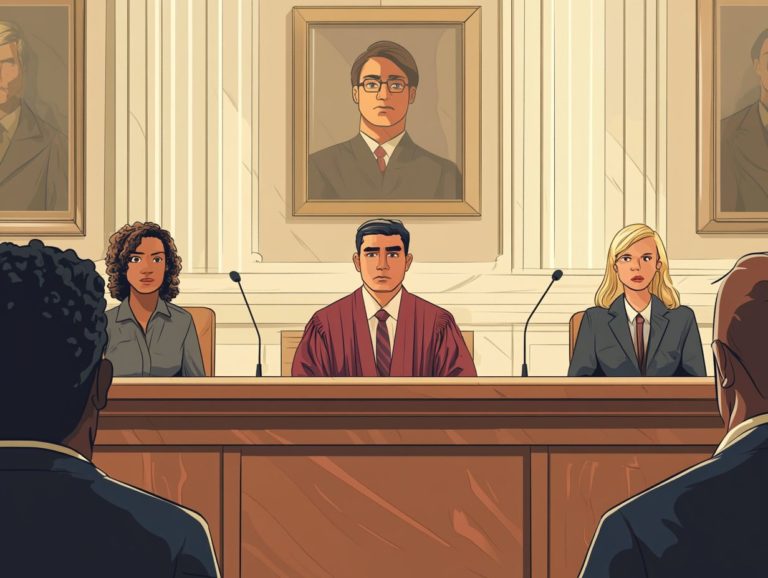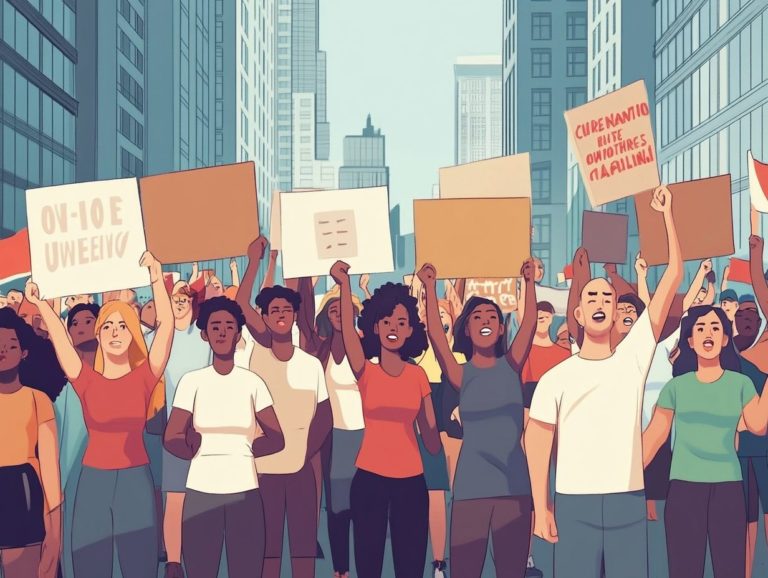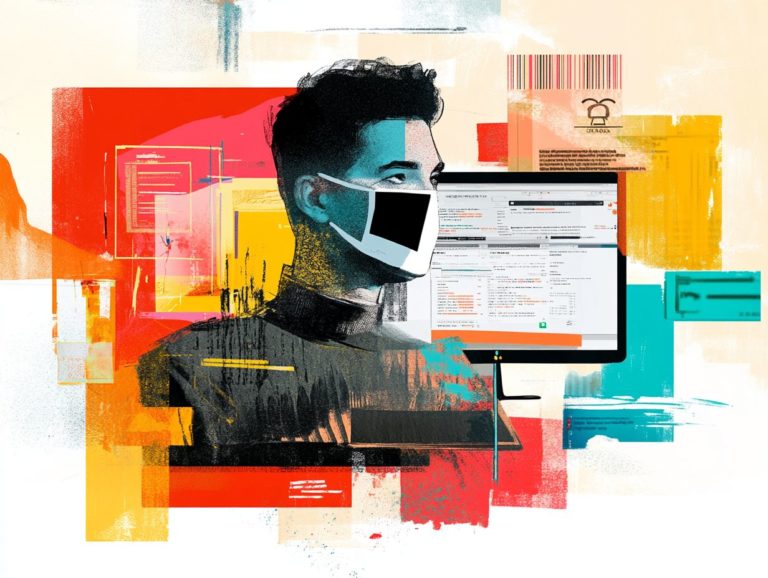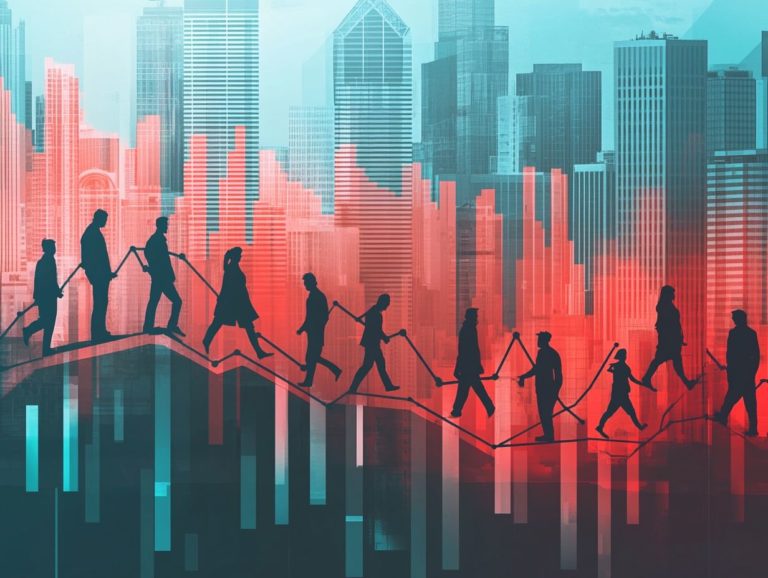Domestic Violence: Types and Legal Consequences
Domestic violence is a widespread issue that impacts countless individuals and families.
Recognizing its various forms whether physical, emotional, financial, or sexual exploitation is essential for understanding the signs and responding effectively.
This article delves into these types of domestic violence, outlines the legal consequences for perpetrators, and highlights the resources available for those seeking assistance.
By illuminating this critical topic, the aim is to empower victims and foster a more robust dialogue about prevention and support.
Contents
- Key Takeaways:
- Understanding Domestic Violence
- Types of Domestic Violence
- Legal Consequences of Domestic Violence
- Seeking Help and Support
- Frequently Asked Questions
- What is considered domestic violence?
- What are the different types of domestic violence?
- What are the legal consequences of domestic violence?
- What should I do if I am a victim of domestic violence?
- Can a victim of domestic violence press charges?
- Are there any resources available to help victims of domestic violence?
Key Takeaways:
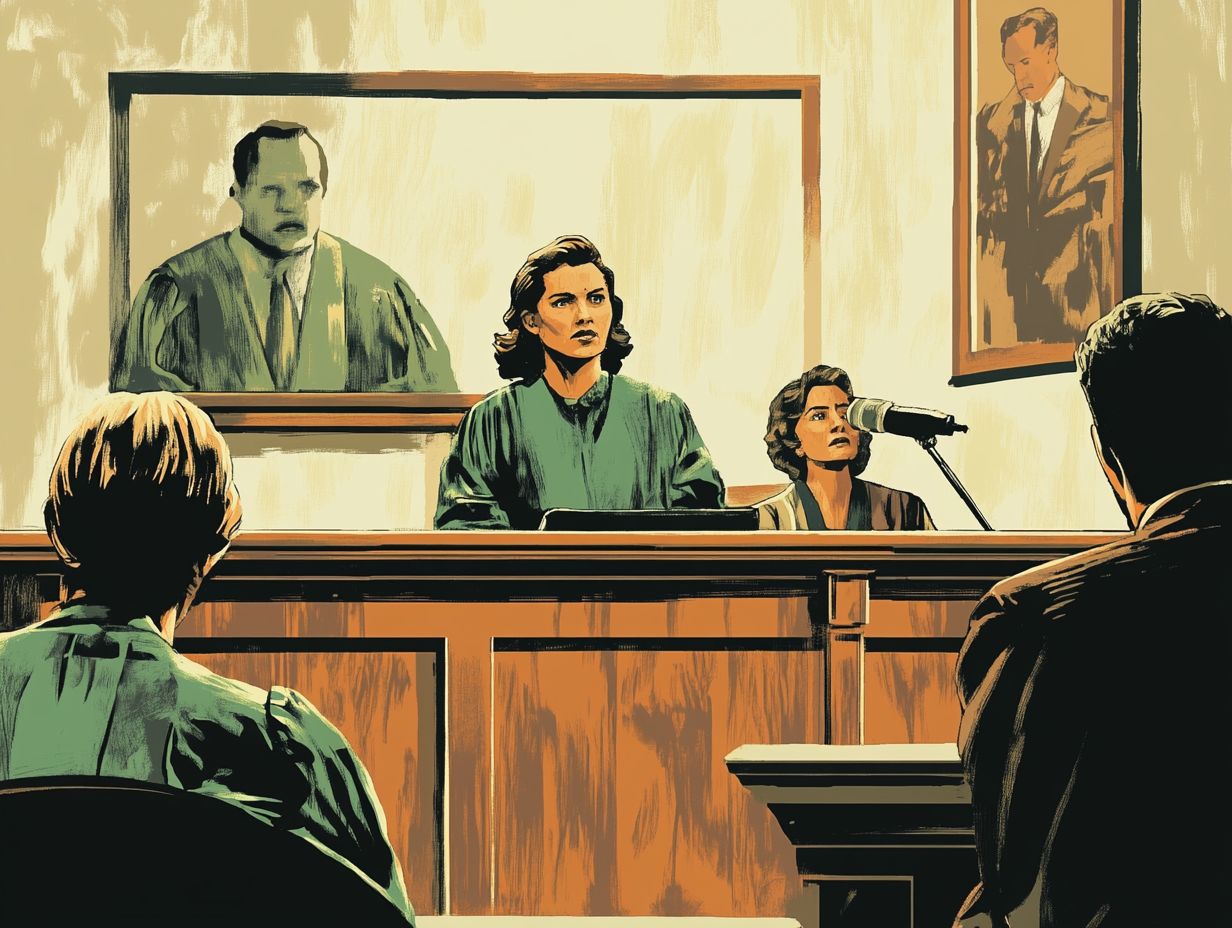
Domestic violence includes various abusive behaviors: physical, emotional, financial, and sexual abuse.
Perpetrators face serious consequences, such as criminal charges and protective orders.
If you or someone you know is experiencing domestic violence, seek help immediately. Hotlines and support resources can provide vital assistance and protection.
Understanding Domestic Violence
Understanding domestic violence is crucial. It includes various forms of abuse like physical, emotional, and psychological harm.
This issue extends beyond physical acts. It may involve manipulation, financial control, and threats, all affecting victims’ rights and family dynamics.
The Violence Against Women Act highlights legal consequences for abusers. It also sets up support systems and resources for victims.
Awareness of these issues can lead to better crisis intervention and effective prevention strategies.
Defining Domestic Violence
Domestic violence refers to abusive behavior in intimate relationships. One partner may use physical, emotional, or economic power against the other.
This abuse can take many forms, such as physical assault or coercive tactics. Psychological abuse often includes manipulating someone’s perception of reality, leading to isolation and confusion.
Legal definitions recognize that this type of violence includes emotional harm from threats. Victims often face long-lasting trauma, affecting their mental health and overall well-being.
Support systems like hotlines and shelters provide essential resources. These can help individuals escape toxic environments and start rebuilding their lives.
Types of Domestic Violence
Domestic violence comes in different forms: physical, emotional, financial, and sexual abuse. Each type aims to control the victim in unique ways.
Physical Abuse
Physical abuse involves using force against a partner. This can include hitting, slapping, or other harmful actions.
Violence can escalate over time as the abuser tries to gain control. This behavior can lead to serious legal consequences for the abuser.
As a victim, you may suffer immediate injuries and long-term health issues. The emotional impact can lead to anxiety, depression, and isolation.
Access to support services like hotlines and counseling is vital. These resources help victims regain safety and independence.
Emotional Abuse

Emotional abuse is a subtle yet powerful form of manipulation that gradually erodes your self-esteem and sense of worth. It often includes coercive behaviors like verbal insults, isolation tactics, and mental manipulation that can leave lasting damage.
You may find yourself ensnared in a cycle of self-doubt, constantly questioning your reality. You feel powerless to break free from the harmful dynamics of the relationship.
This type of abuse tends to manifest in insidious ways, making it difficult to identify the signs. They can be so subtle that they become normalized within a toxic environment.
Over time, the emotional scars can result in significant psychological harm, including anxiety, depression, and even Post-Traumatic Stress Disorder (PTSD). You must seek out community resources now to protect yourself.
Supportive networks can offer guidance, validation, and healing. They enable you to reclaim your autonomy and rebuild your life.
Financial Abuse
Financial abuse occurs when one partner controls your money and spending, creating a situation of financial dependence that can trap you in an abusive relationship.
This insidious form of manipulation often surfaces through tactics such as controlling bank accounts. It includes restricting access to funds and closely monitoring your spending habits.
As a result, you may feel helpless and unable to escape your circumstances. This makes it exceedingly difficult to envision a more independent future.
The implications of such control extend beyond mere financial hardship. They can significantly impact your self-esteem and emotional well-being.
Resources exist to help you regain your financial independence. Financial literacy programs and support networks enable you to take charge of your economic situation and carve a path toward a brighter future.
Sexual Abuse
Sexual abuse within the realm of domestic violence encompasses a disturbing array of non-consensual sexual acts. These infringe on your rights and often result in significant legal repercussions for the abuser.
These acts can range from unwanted sexual advances to more severe forms of assault. They leave behind enduring emotional and psychological wounds.
The aftermath may manifest as anxiety, depression, and challenges in establishing healthy relationships moving forward. Understanding the legal protections available under domestic abuse laws is essential.
These laws provide a vital framework for you to seek justice and protection. This includes restraining orders and criminal charges against offenders.
There are numerous victim support services and community resources at your disposal. They offer counseling, legal advice, and safe shelters.
These resources enable you to reclaim your life and embark on a path toward recovery.
Legal Consequences of Domestic Violence
The legal consequences of domestic violence can be quite profound. They encompass a spectrum of penalties designed to protect victims and hold abusers accountable.
These may include restraining orders, criminal charges, and civil remedies. All of which serve to create a safer environment for those affected.
Understanding these implications is essential for navigating such challenging circumstances.
Criminal Penalties
Criminal penalties for domestic violence offenses can vary significantly. They often encompass jail time, fines, and mandatory counseling, reflecting the gravity with which the legal system regards these crimes.
Depending on your jurisdiction and the severity of the offense, an abuser may also face probation or community service requirements. Law enforcement plays a vital role in enforcing these penalties.
Trained police officers are essential in this process. They gather evidence, file reports, and make arrests when necessary.
For victims, securing legal representation is crucial. An experienced attorney can advocate for your rights and navigate the complexities of the judicial process.
They ensure your voices are heard, ultimately leading to a more just resolution.
Protective Orders

Protective orders, often referred to as restraining orders, serve as vital legal measures to safeguard you from further harm by preventing the abuser from contacting or approaching you.
These orders can be an essential tool for anyone seeking safety and stability, enabling you to reclaim your sense of security.
To obtain such an order, you typically need to file a petition with your local court, where you ll provide evidence of any threats or harm you ve experienced.
It s important to understand the differences between temporary and permanent orders. A temporary order grants immediate protection, usually lasting until a court hearing is held. In contrast, a permanent order can extend for years and requires a more thorough review process.
In urgent situations, you can also pursue emergency protection orders, which are designed to be granted swiftly to address immediate threats.
Navigating the legal system may seem overwhelming, but there are resources available to guide you through the process. Legal aid services, advocacy groups, and support hotlines can help.
Child Custody and Visitation Rights
Child custody and visitation rights can be profoundly influenced by domestic violence. Courts often prioritize the safety and well-being of both the child and the victim in their decisions.
This emphasis arises from a growing awareness of how exposure to violence can negatively impact a child’s emotional and psychological development.
In custody disputes, judges meticulously assess evidence of past abuse. They consider how it might affect current living arrangements and the child’s overall mental health.
Legal frameworks typically offer mechanisms for victims to obtain protective orders. These orders can directly shape custody arrangements by limiting the abuser s visitation rights.
As you navigate these challenging circumstances, connecting with advocacy groups and legal resources specifically designed for domestic violence survivors is essential.
Effective safety planning is vital, enabling you to devise strategies that safeguard both yourself and your children while ensuring you remain informed about your rights and available support systems.
Civil Lawsuits
Victims of domestic violence can pursue civil lawsuits against their abusers. A civil lawsuit is when someone takes another person to court to seek money for damages incurred due to the abuse.
This legal route enables individuals to hold their abusers accountable not only through the penal system but also in a civil context.
By doing so, you may secure compensation for medical expenses, emotional distress, lost wages, and other repercussions of the abuse.
As you navigate the complexities of the legal system, securing competent legal representation is essential.
An experienced attorney will guide you through the filing process, assist in gathering necessary evidence, and present a compelling case aimed at maximizing your potential for damages.
Such actions not only provide vital support for victims but also emphasize the importance of accountability, acting as a deterrent against future abuse within both civil and criminal frameworks.
Seeking Help and Support
Seeking help and support is an essential step for victims of domestic violence. There are numerous hotlines, community resources, and victim support systems ready to offer immediate assistance and facilitate long-term recovery options.
Don t hesitate to reach out for help – you deserve support and safety. Recognizing that reaching out can pave the way to healing and a brighter future is crucial.
Hotlines and Resources
Hotlines like the National Domestic Violence Hotline provide essential support for you. They offer immediate assistance and connect you with vital community resources and victim support services.
These confidential and anonymous services are available 24/7, ensuring that when you re in crisis, help is always within reach.
You can access emotional support, receive advice on safety planning, and learn about your legal rights.
These hotlines often work in tandem with local shelters, legal aid organizations, and counseling services. This interconnected approach enables you to take control of your situation and raises awareness about the resources available in your community.
Creating a Safety Plan
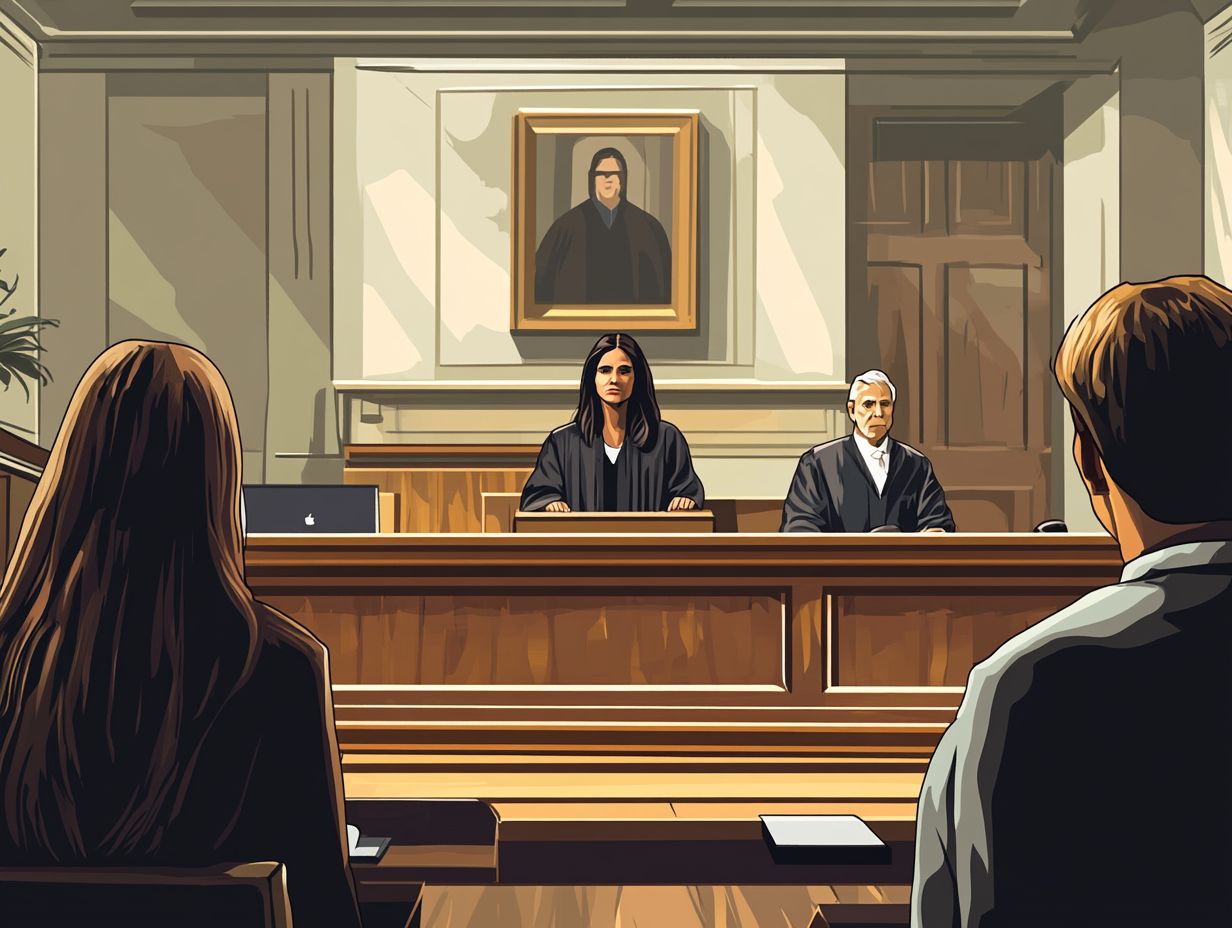
A safety plan is your key to safety and peace of mind during a crisis. It offers a personalized strategy to ensure your safety and well-being in potentially dangerous situations.
As you develop this plan, it s essential to identify safe places where you can go in emergencies whether that s a friend s house, a shelter, or a family member’s home.
Compile a list of emergency contacts, including trusted friends, local shelters, and authorities who can provide immediate assistance.
Designing clear escape routes from your home and being aware of exits can significantly enhance your safety. Equally important is recognizing the value of emotional support.
You may find comfort in counseling services or support groups, which can aid your healing journey and foster resilience during difficult times.
Victim support services provide crucial resources. They can help you reclaim control over your life.
Frequently Asked Questions
What is considered domestic violence?
Domestic violence is a pattern of abusive behavior that one partner uses to gain power and control over the other in an intimate relationship. It can include physical, emotional, sexual, and financial abuse.
What are the different types of domestic violence?
The different types of domestic violence include physical abuse, emotional abuse, sexual abuse, financial abuse, and psychological abuse. Each type can have serious consequences and can be equally damaging to the victim.
What are the legal consequences of domestic violence?
The legal consequences of domestic violence can vary depending on the severity of the abuse and the area where the laws apply. They can include restraining orders, fines, jail time, and mandatory counseling or anger management classes.
What should I do if I am a victim of domestic violence?
Don t wait! Reach out for help immediately from trusted friends, family, or professionals. You should also consider contacting a domestic violence hotline or seeking legal assistance to understand your options and rights.
Can a victim of domestic violence press charges?
Yes, a victim of domestic violence can press charges against their abuser. However, in some cases, the state may press charges on behalf of the victim even if they do not want to press charges themselves. It is important to consult with a legal professional for guidance.
Are there any resources available to help victims of domestic violence?
Yes, there are several resources available to help victims of domestic violence, including hotlines, shelters, support groups, and legal aid organizations. These resources can provide emotional support, safety planning, and assistance with legal matters.
Remember, you are not alone, and help is available!


